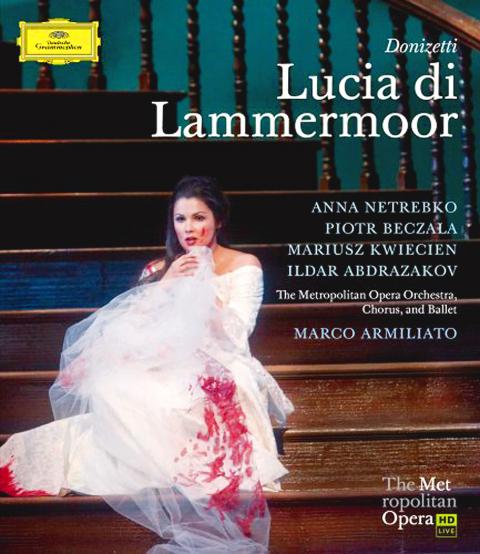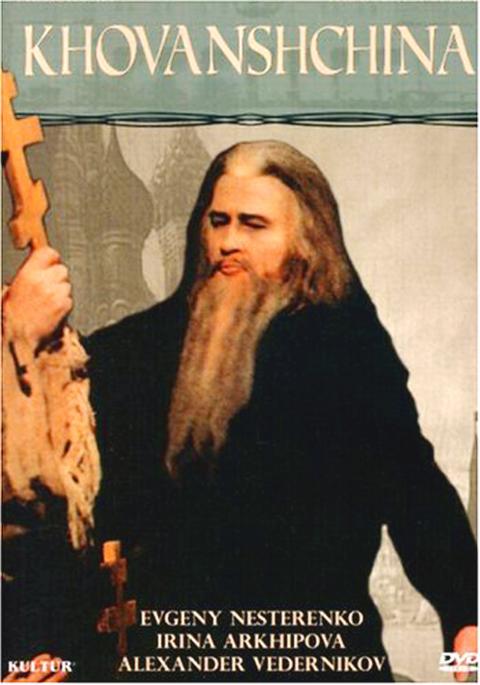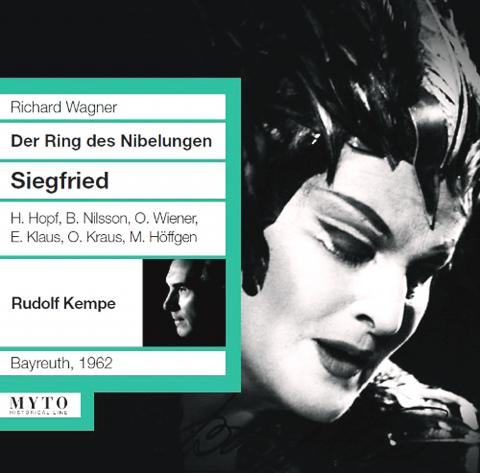LUCIA DI LAMMERMOOR, By Donizetti, Netrebko, Beczala, Kwiecien, DG 0734545 (Blu-ray); KHOVANSHCHINA, By Mussorgsky, Nesterenko, Arkhipova, Vedernikov, Kultur D1163; SIEGFRIED, By Wagner, Hopf, Nilsson, Weiner, Myto Historical 00325 [3 CDs]
The Blu-ray disc of the Metropolitan Opera’s production of Donizetti’s opera Lucia di Lammermoor starring Anna Netrebko supplements the DVD issue of 2009. Opinions have differed about its merits, but I enjoyed it enormously. In particular, Netrebko contributes a vocal freshness and purity of tone that wonderfully complements the visually resplendent production of Mary Zimmerman.
This latter moves the action, totally credibly, to the late 19th century, with umbrellas, champagne flutes and a magnesium-flare wedding photo on the last note of the great sextet (after which Lucia collapses). Earlier, and again at the end, a physical ghost is seen wandering the moonlit stage.

All in all, this is an opera DVD to treasure, both visually and musically. The orchestra under Mario Armiliato plays with such clarity, illuminating Donizetti’s under-estimated score, that I was convinced for the first time in my life of its genuine greatness. I’d previously been over-influenced by what seemed, and still seems, the essential frivolity of the endless soprano-plus-solo-flute-accompaniment of the mad scene.
The men are immensely strong. Piotr Beczala, substituting for Rolando Villazon as Edgardo, won many hearts, while Manusz Kwiecien is flawless as the villain, Enrico.
Captions are in English, Chinese, Italian, German, French and Spanish. Earlier this year the whole production was uploaded onto YouTube.

What are the differences between Italian opera and the Russian variety? Speaking of the 19th century, the Russian style lacks the vitality and electric dynamism of the typical Italian version. In their place it offers a preponderance of bass voices and baleful mezzo-sopranos. Whereas Italian operas tend to focus on conflicts within individuals, the Russian form evokes national conflicts featuring the church, the tsars and the rebellious boyars, blocks of soulful feeling that collide as unsubtly as tectonic plates.
This, at any rate, is the ambiance of Mussorgsky’s Khovanshchina (1886), created in a decade that saw the premieres of Verdi’s Otello and Wagner’s Parsifal. It isn’t a work that’s received a great many videoed performances, but one has recently come to hand that was taped live at the Bolshoi Opera in 1979. Sets are monumental (and seem to resemble the originals from a hundred years earlier), costumes are traditional, stage gestures wooden and the atmosphere Russian in the extreme.
The great Russian bass Evgeny Nesterenko sings Dosifei, a leader of the church sect known as the Old Believers, while another bass, Alexander Vedernikov, plays Khovansky, captain of the feared Streltsy Guards. Marfa, a fortune-teller and follower of Dosifel, is sung by Irina Arkhipova.

The plot is convoluted, and the situation is made more confusing by the prohibition at the time of the portrayal of members of the Romanov dynasty onstage. The dance of the Persian slaves is distinctly underwhelming (two or three Korean pop groups should have been given the job), and the self-immolation of the Old Believers at the end entirely lacks the necessary horror. The greatness of Russian art, you’re left feeling, lies in its literature, not in its operas.
This DVD, then, is mainly of interest to those wanting to explore the Russian repertory, rather than those wanting the primary operatic experience. Subtitles are in English only, and imprinted on the video. The entire opera, lasting almost three hours, is contained on the one DVD.
Recordings held for 50 years and more are still coming onto the market. One assumes they have taken so long because of poor audio quality that modern technology can now do a lot to improve. Whatever the reason, the performance of Wagner’s Siegfried recorded live at Bayreuth on July 30, 1962 is a rare delight. You soon forget the audio shortcomings that remain — very fine recordings were made prior to this date, but in studios — and you’re quickly overwhelmed by the commitment and sheer voraciousness on display on these CDs.
The conductor was Rudolf Kempe, much loved in the UK at the time, and the title role is sung with enormous attack and brilliance by Hans Hopf, apparently tackling the part for the first time. Birgit Nilsson is, as always, an incomparable Brunnhilde, closing the opera on a staggering, trumpet-like note. And Wotan is sung by Otto Wiener in a manner that’s not out of place in the company of his more celebrated co-stars. Five minutes of Wagner is worth three hours of Mussorgsky, you feel.
Remaining on the subject of Wagner, the cancellation last month of the middle performance of Die Walkure in Taipei owing to Typhoon Soulik must have been a terrible disappointment for everyone who’d bought tickets. It had been sold out, as were the other two performances. It is greatly to be hoped that the National Symphony Orchestra (NSO) will now stage a revival. They still presumably have the sets — excellent, apparently — and though the visiting soloists may have to be different ones, the NSO management can be almost certain that another two, or even three, performances will be sold out again. It is the least they can do in the aftermath of a devastating, albeit perhaps a necessary, decision.

May 18 to May 24 Pastor Yang Hsu’s (楊煦) congregation was shocked upon seeing the land he chose to build his orphanage. It was surrounded by mountains on three sides, and the only way to access it was to cross a river by foot. The soil was poor due to runoff, and large rocks strewn across the plot prevented much from growing. In addition, there was no running water or electricity. But it was all Yang could afford. He and his Indigenous Atayal wife Lin Feng-ying (林鳳英) had already been caring for 24 orphans in their home, and they were in

On May 2, Chinese Nationalist Party (KMT) Chairman Eric Chu (朱立倫), at a meeting in support of Taipei city councilors at party headquarters, compared President William Lai (賴清德) to Hitler. Chu claimed that unlike any other democracy worldwide in history, no other leader was rooting out opposing parties like Lai and the Democratic Progressive Party (DPP). That his statements are wildly inaccurate was not the point. It was a rallying cry, not a history lesson. This was intentional to provoke the international diplomatic community into a response, which was promptly provided. Both the German and Israeli offices issued statements on Facebook

Even by the standards of Ukraine’s International Legion, which comprises volunteers from over 55 countries, Han has an unusual backstory. Born in Taichung, he grew up in Costa Rica — then one of Taiwan’s diplomatic allies — where a relative worked for the embassy. After attending an American international high school in San Jose, Costa Rica’s capital, Han — who prefers to use only his given name for OPSEC (operations security) reasons — moved to the US in his teens. He attended Penn State University before returning to Taiwan to work in the semiconductor industry in Kaohsiung, where he

President William Lai (賴清德) yesterday delivered an address marking the first anniversary of his presidency. In the speech, Lai affirmed Taiwan’s global role in technology, trade and security. He announced economic and national security initiatives, and emphasized democratic values and cross-party cooperation. The following is the full text of his speech: Yesterday, outside of Beida Elementary School in New Taipei City’s Sanxia District (三峽), there was a major traffic accident that, sadly, claimed several lives and resulted in multiple injuries. The Executive Yuan immediately formed a task force, and last night I personally visited the victims in hospital. Central government agencies and the